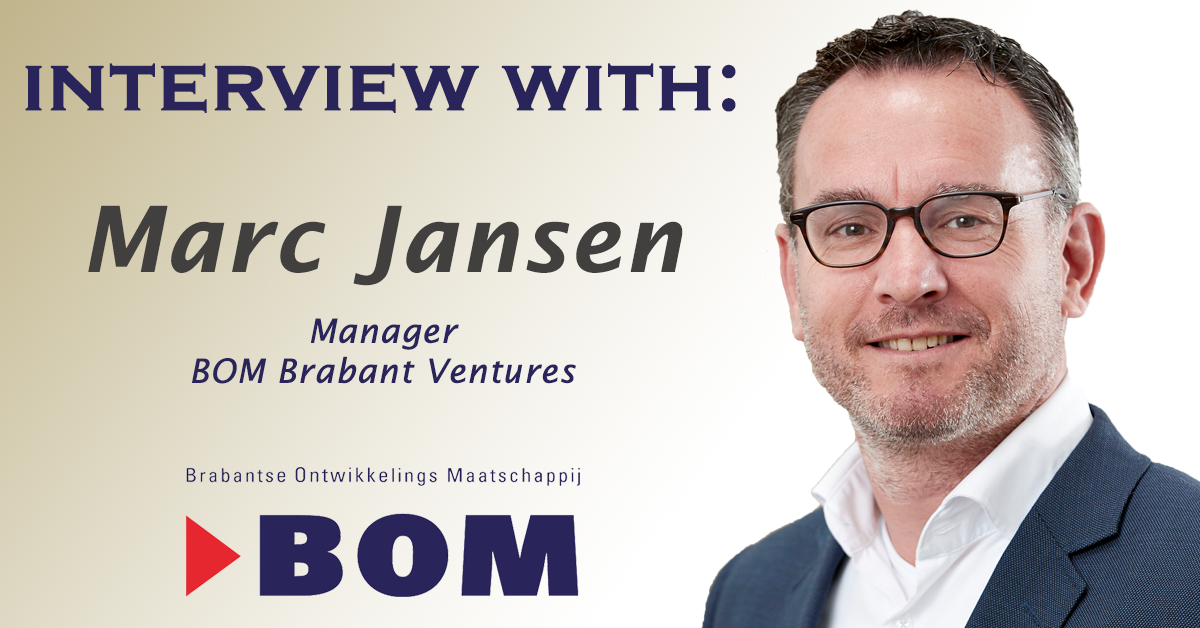BOM Brabant Ventures is a development company as well as venture capital investor based in Tilburg. BOM exerts itself in promoting sustainable development of the economy in the province of North Brabant. What does a job in venture capital look like? Does responsible entrepreneurship obstruct financial success? We spoke with Marc Jansen, manager at BOM Brabant Ventures.
Marc, can you tell us something about your study time and career path?
After high school, I studied IT in Eindhoven. I discovered that IT was not really for me, so I went to Tilburg to study Economics. I found out that I liked all different fields of economic, but my most preferred subjects were technical and numerical classes. After five years I finished my Master in Finance, doing an internship at KPN about currency risks. Next to my study I did a lot of side activities at AIESEC, where I was the chairman. I gained a lot of international experience as chairman, for example by attending congresses abroad. I also worked at a bar to earn some money.
When I had my master’s degree, I served in the army for one year as officer, because at the time there was still an obligatory military service in effect in the Netherlands. After serving, I decided to work at ABN AMRO, where I started, after a traineeship, as consultant for small to medium sized companies. I chose for a banking career because at a bank, you get to know not only one, but a lot of different companies. I have had a lot of jobs within ABN AMRO, most of them as in management roles in the Midcap clients segment. Because I switched to a new function every few years, I kept developing myself.
When I was head of Finance for the South of the Netherlands, ABN AMRO was split and sold to three banks. As ABN AMRO merged with Fortis, which was later nationalised during the credit crisis, the European committee demanded this split up in the Netherlands. The split up part was bought by Deutsche Bank. At Deutsche bank, I worked amongst other things as head Credit Risk for small to medium sized companies. The financial sector kept shrinking after the economic crisis, so I started to orientate myself to other possibilities, which allowed personal development in different fields. Soon after I started reorienting myself, an old colleague from ABN AMRO called, who was managing BOM Capital at that time. As the province of Brabant received a large sum of money from the sale of Essent, money was made available to stimulate innovative entrepreneurship. Two teams had to be formed. I got the opportunity to build the LifeTech team.
What does BOM do exactly?
Within BOM, there are three types of clients. BOM Foreign Investments aims to attract (innovative) foreign companies to Brabant. The assembly and distribution centre of Tesla, which settled in Tilburg, is an example of a success story of this team. This team helps entrepreneurs in Brabant to get foreign contacts, to e.g. expand their selling market. Next, we have an energy fund, where investments are made for developing and stimulating sustainable energy-projects. Last, we have BOM Brabant Ventures, which focusses on stimulating and developing businesses in Brabant, by amongst other things providing expertise, a network, capital and coaching.
”At BOM, economic gains are only one of the criteria for our investments.”
BOM Brabant Ventures invests in (early-phase) innovative and technological businesses/projects. In 2014, BOM received €200 million from the province of Brabant, to expedite local business.
What distinguishes BOM Brabant Ventures from other capital providers?
BOM invests mostly in companies that are still in an early stage, mostly the Idea, Start up and Scale up phases by often taking an equity position in the enterprise. Because these companies are still very young, there is a lot of risk in these investments. Banks only fund these companies to a very limited extend. For private equity providers, the capital needs of these companies is mostly too small, because of fixed costs that accompany any investment (think of things like due diligence, market research, etc.). These young companies often rely (partly) on venture capital for financing. Only one in ten projects/companies where we invest in actually becomes a big success. This risk is reflected in our high discount rate of 25% up to 60%. We work together closely with other investors and only put in money if other parties also take care of a part of the financing. Fortunately, many of the other projects out of ten are successful as well, but returns are limited as goals are not met as fast as expected or more capital is required to meet the goals.
Besides all this, the focus at other money providers is almost always making a profit. At BOM, economic gains are only one of the criteria for our investments. We look at the sustainability of the project and the executing company, the economic impact on Brabant, and the importance of the investment for the entire ecosystem. We don’t invest in businesses that only meet the criteria for a high potential return. This also works the other way around. Businesses that are very social, but are not eligible for a profit on the long term, are not sustainable either. It’s about the balance between these things.
How does BOM Brabant Ventures get investment applications?
The areas of expertise of my colleagues at BOM are very diverse. We have employees with amongst others molecular biology, physics, legal, technical and economic backgrounds. Because there are a lot of different backgrounds that are represented within BOM, we know what is going on in a lot of different disciplines. We are often actively looking for sustainable businesses/projects where we might want to invest in.
We identify about 500 investment opportunities each year, and about 20 actually receive an investment by us. Additionally, we help about 60 companies a year with coaching and support, or getting contacts and / or financing elsewhere.
Do you have an example of a success-story you were involved in?
Two of our most prolific success stories are Acerta Pharma and Protix Biosystems. Acerta Pharma, a pharmaceutical company that produces medicine to treat cancer, got an investment from BOM in an early stage of its development. The development of the medicine is thriving, and by now, the British-Swedish AstraZeneca bought 55% of the shares in Acerta Pharma for 4 billion dollar. Acerta Pharma will receive up to an additional 3 billion dollars if the medicine is brought to the various markets. Despite the fact that our share in the company has been watered down due to multiple financing rounds over the years, we have made a really nice return on this investment. An important factor in this story of success was, besides the entrepreneurs and our role, the initial co-investor, BGV, who connected the company with the right partners. Besides the financial profit we ran on this project, there is also a huge societal impact if the medicine can help people with cancer. An exit valued at 7 billion is, of course, a big exception.
”Businesses that are very social, but are not eligible for a profit on the long term, are not sustainable either.”
Protix Biosystems is a company that develops sustainable proteins that serve as alternative nutrition for cattle. Different insects, under which the black soldier fly, transform organic waste into proteins. The nutritional value of insects is increasingly seen as the possible solution to the looming global food shortages. This company from Brabant is momentarily investing millions in a newly built facility in Bergen op Zoom. This possibly provides the city with about 80 jobs!
What advice would you give people that are currently studying?
My first advice: look for a company that fits you personally through participating in for example business courses. Such events gives you a lot more information than for example an in-house day, which by the way is also a good way of getting an insight. Always do the best you can. Some subjects might seem less interesting now, but it is possible that later in your professional life, everything you learned in college gives you a good perspective.
The most important thing is that you do something that you enjoy and gives you energy. Within every job there are some tasks or parts that you don’t like, but for the most part it should be fun. With the current tight labour market, graduates with a university degree can easily ask their employer for a different job if you don’t like what you do.
Also, after finding a fitting job, you must remain motivated. Do courses and develop your qualities. Stay up to date in your discipline and read ‘Het FD’ or ‘The Economist’. Keep developing yourself by taking courses. I got the opportunity take courses at the Amsterdam Institute of Finance, Insead and Saïd Business School in Oxford. Next to the tips above, I would like to say to you: A healthy mind lives in a healthy body.

















